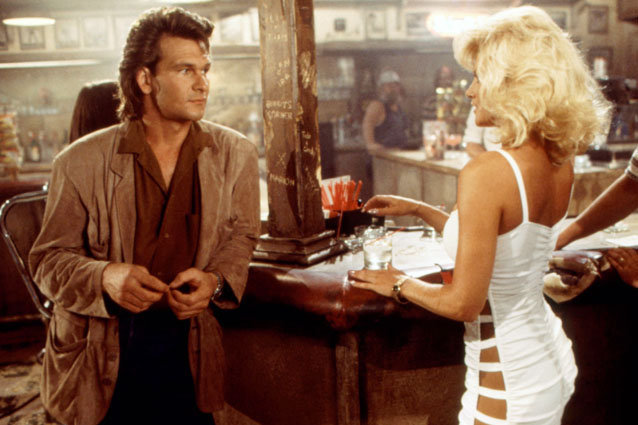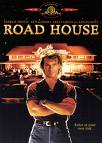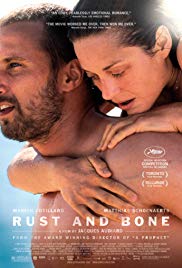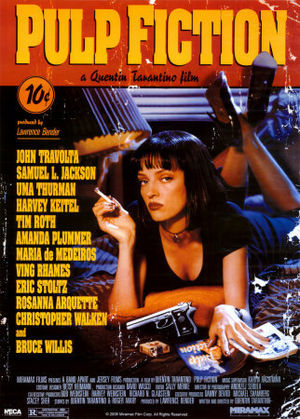
Opinions vary, but ‘Road House’ is strong contender for funniest film ever made
Critics have little to no respect for “Road House.” They don’t get it, and that’s OK, because the cable TV networks do get it. And probably better to linger for generations as a TV hit than fade away in weeks with critical praise (“Adaptation,” anyone?).
“Road House” is a Western, and is little different than classics such as “Shane” or “Pale Rider,” but because it is set in a seedy tavern, and the characters don’t look like Clint Eastwood or John Wayne, it never had a chance for critical gravitas.
“ ‘Road House’ is not a good movie — that’s for sure,” said Roger Ebert many years back, on his TV show with Gene Siskel.
“It’s so out there — it’s so cartoon-like,” Siskel concurred.
Thumbs down from both.
Hey, everyone’s entitled to a mistake.
“Road House” is a legendary success not just because it is probably the best butt-kickin’ movie of all time. Sure, there might be something out there by Stallone, Seagal, Van Damme, Bruce Lee, etc., but those are the movies that are actually “out there” and “cartoon-like.”
“Road House” happens to be one of the funniest films ever made.
“I laughed a lot during this movie,” Ebert conceded. “It was genuine laughter.”
Indeed. Writer “David Lee Henry,” like Sylvester Stallone (the credited writer) with “Rocky III,” somehow hit the jackpot. Henry is a pseudonym that has puzzled many and now is said to be the Canadian R. Lance Hill. Nearly every line is hilarious, many of them fall-out-of-the-chair laughable. In writing about bouncers, Henry is anything but a cooler.
And oh yeah — something Siskel and Ebert failed to note: “Road House” has one of the greatest villains in Hollywood history.
Ben Gazzara’s lack of an Oscar nomination for his turn as Brad Wesley is hardly the only slight. Director Rowdy Herrington might’ve let “Dirty Dancing” hero Patrick Swayze turn this plot into a star vehicle, but he insists on adding some of the most unforgettable — and unlikely — supporting cast members of any Western. There is Morgan, played by pro wrestler Terry Funk, getting fired and grabbing that severance check in the most watchable way anyone has ever grabbed a severance check. There is Tinker (John Young), who says he doesn’t know what happened because “a polar bear fell on me.” There is the landlord, Emmet (“Sunshine” Parker), explaining, “Calling me ‘sir’ is like putting an elevator in an outhouse — don’t belong.” There is Denise, Wesley’s “pet” (played by collegiate gymnast/Miss America contestant/future stuntwoman Julie Michaels), asked by a bar patron if he can get “nipple to nipple” with her and responding “I can do that without you.”
The story is one you’ve seen in countless Westerns. The good folks of a small community are under siege from a tyrant, who exploits the people and businesses for his own wealth and satisfaction and does not care what trash he leaves behind. The townspeople accept it because they are outnumbered — Wesley employs lots of thugs — and perhaps because of battle fatigue. The local cops are apparently under Wesley’s thumb, and an offer to contact someone in the Springfield FBI office is met with a sigh.
Herrington’s movie uses an effectively deliberate strategy in pitting the hero against the bad guy. It takes time for them to get to know each other, as Dalton gradually encounters Wesley harassing people Dalton will consider friends. Dalton’s entree into Jasper is small potatoes. A savvy businessman, Frank Tilghman, owns a nightclub and merely wants to improve it. Somehow through connections in the bouncer world, he has heard of “the best damn cooler in the business” and has flown out to the East Coast to hire Dalton. Dalton insists “Wade Garrett’s the best,” and Tilghman has heard of him too. But “Wade Garrett’s getting old,” Tilghman explains.
So Dalton is hired, and this shouldn’t be a big job, right? Just clear the riff-raff out of the tavern and make it suitable for decent people. Nothing about confronting racketeering schemes and organized crime.
Ah, but this tavern, the Double Deuce, is somehow different. There isn’t just roughhousing and an occasional punch flying around. There is criminal battery, theft, drug dealing, mob action. Dalton can see for himself the moment he walks in, but it’s his old friend Cody playing in the fence-protected house band who gives him the lowdown. “Man, this toilet is worse than the one that we worked in Dayton,” Cody says, an indication that Dalton and his acquaintances have seen this kind of place before, just maybe not at this level. Dalton and Garrett will agree that it’s amazing what one can get used to: Says Garrett, “This place has a sign hanging over the urinal that says “Don’t eat the big white mint.’ ”
Herrington’s bar escapades are indeed over the top, and they should be. Yes, in a real town, even a remote location somewhere, a police chief or sheriff would shut this kind of place down. But Herrington can extend artistic license to the mayhem of the Double Deuce because we will soon learn that Wesley runs the policing in Jasper, and this is one place Wesley really could not care less about.
Tilghman crowns Dalton the new king of the Double Deuce in a legendary scene that even non-fans have heard of. "From now on he’s in charge of all the bar business — what he says ... goes!” Tilghman says, and Dalton quickly addresses the underachieving group of employees all gathered around him like little kids in school listening to a new principal.
“People who really want to have a good time won’t come to a slaughterhouse,” he says. “And we’ve got entirely too many troublemakers here. Too many uh, forty-year-old adolescents, felons, power drinkers, trustees of modern chemistry. It’s going to change.”
Then he lays down the law. “All you have to do is follow three simple rules. One: Never underestimate your opponent. Expect the unexpected. Two: Take it outside. Never start anything inside the bar unless it’s absolutely necessary. And three: Be nice.”
Where Dalton crosses the line with Wesley — or is it the other way around — is when his dismissals extend to Pat McGurn, a good-for-nothin’ bartender who was caught skimming. “So consider it severance pay — take the train,” Dalton suggests, and when Tilghman backs him up on this call, it means war with Wesley, until either someone backs off or winds up dead.
Roger Ebert said “There are about 16 different messages in this film, all of them completely confusing and meaningless.” He did not explain how he came up with 16 or what they are. There’s only one important one that comes to mind, and it is hardly atypical of a Western: Regular Joes being inspired by an outsider to stand up for themselves.
“Road House” differs with “Shane” in doling out credit. Shane is the gunfighter who is enlightened, sadly, to learn he doesn’t have a place in the new world. But the real hero of the picture is Joe Starrett, whose determination and values are enough to win even grudging praise from his archenemy, and most importantly, are enough to draw the likes of Shane into the battle on his side.
Dalton is going to get 100 percent of the character arc in “Road House” because unlike Shane, his demons are beatable. Maybe the hired gun does have a permanent place in the community, if he can control the buried rage that at least partly motivates him. This will be Herrington’s biggest shortcoming with this picture. We are only told in conversations how Dalton ever came to be in trouble, and when a similar moment occurs under the most extreme duress, it’s pretty hard to find fault with his actions. And thus seeing him ultimately refrain from a repeat when others perform more or less the same function is not a particularly convincing way of proving that Dalton has exorcised his demons safely enough to rejoin society.
Herrington obviously enjoys the subtext of homosexuality. Someone with a healthy imagination might say this is the real raging battle between Wesley and Dalton.
Neither one initially has a woman in his life. With Dalton we are led to believe it is something about his past. With Wesley, it might be lack of interest. The implication is that Wesley is gay. We see him wearing a pink bathrobe and saying of one of his henchmen, “I love this guy. Isn’t he cute.” And we ultimately hear a top lieutenant discuss same-sex encounters in jail, so there’s ample reason to wonder what exactly is going on in the Wesley estate.
This suggests that Dr. Elizabeth Clay (Kelly Lynch) is not so much the prize that Dalton and Wesley are fighting over, but the trophy Wesley wishes he actually wanted. “You know who had a thing for Elizabeth Clay? Brad Wesley,” Cody tells Dalton. “As I hear it, she left town, and he went nuts.”
The suspicion here is that Herrington is having fun with Wesley and also supplying a reason as to why he’s “such an a------.” He’s afraid to come clean about who he really is, and thus the constant presence of a shirtless Dalton brings out even more of the worst in him. (This is a butt-kickin’ movie, not a particularly sensitive one.)
If Herrington actually explored that angle a bit further it would’ve been a mistake, because then there would be a measure of sympathy or empathy for Wesley. He’s pitch-perfect as is. Gazzara proved to be one of the greatest Hollywood villains ever, trumping even a contemporary great like Alan Rickman’s Hans Gruber. Darth Vader is a villain you must admire on some level; Wesley and Gruber are rich businessmen jerks well beyond the point of vile. The level of hatred one can feel for Wesley in this picture is nothing short of profound. He may have brought 7-11 and JCPenney to town as he claims, but surely that was just another front for the “Jasper Improvement Society,” Wesley’s lightly camouflaged racketeering scheme. The man oozes disgust and contempt from the moment we first see him — carelessly running other cars off the road by driving on the wrong side — and we can’t wait for his comeuppance.
To get to that point, Herrington produces a steady treat of satisfying knockouts and one-liners. It is not a stretch to say that Terry Funk has, collectively, one of the funniest series of lines in film history. From the beginning it is “Yer not drinkin’, yer outta here.” Then we get (and this is a family-friendly Web site), “You know, I heard you had b---- big enough to c--- in a dump truck, but you don’t look like much to me.” Still on the first night, Morgan declares, “So far, he hasn’t shown me s---.”
Of course, the firing scene is epic. “Morgan, you’re out of here.”
“What the f--- you talkin’ about?”
“You don’t have the right temperament for the trade.”
“You a------. What am I supposed to do?”
“There’s always barber college.”
And then he grabs the severance check from Frank Tilghman: “You’re a dead man.”
His final classic, to Wade Garrett: “Mind your own business, dad.”
One has to wonder why people like Morgan and Pat McGurn would be so angry about being fired at the Double Deuce. This “toilet” is worse than the one in Dayton, after all, can’t be making any money, and surely the people there could find other lines of work if they just tried a bit harder. In fact, once canned, they appear to get better jobs in Wesley’s organization.
Wesley employs three levels of goon squads. The chumps are the crew headed by O’Connor, which includes Tinker and Pat and Morgan. On a higher level is Gary Ketchum, who drives the monster truck and gives Wade all he can handle. Finally there is Jimmy, who sometimes uses an associate and sometimes not. As occasionally happens in sports, Dalton actually has more trouble with O’Connor’s group than Ketchum’s.
Kelly Lynch, as Elizabeth Clay, more than satisfies the need for a striking, leggy blonde, but her ambiguous feelings about Dalton’s character will make you wonder at the end, does she really want to do this? The only places the film tends to get bogged down are where Elizabeth gets cranky. “I know you’re not a nice guy,” she tells Dalton at one point. But she does set the table for some of the greatest lines:
“Do you enjoy pain?”
“Pain don’t hurt.”
“Do you always carry your medical records around with you?”
“Saves time.”
“How’s a guy like you end up a bouncer.”
“Just lucky, I guess.”
“You know, in that line of work I thought you’d be bigger.”
“Gee, I’ve never heard that before.”
Wade Garrett gets it: “That gal has got entirely too many brains to have an a-- like that.”
Not all of Dalton’s enemies are Wesley-associated. Dalton has to fire Steve, the pretty-boy bartender played by Gary Hudson (“What if someone calls my mama a whore?” “Is she?”), and finds an easy opportunity when Steve is with his Saturday night squeeze in a closet. “Yo Steve — you’re history.” “But I’m on my break.” “Stay on it.” The first cleanup effort is a great sequence because it involves a detestable punk who wants his girlfriend to strip on one of the tables. “I say let her dance!” he declares, before whipping out a switchblade, and it takes Dalton all of about three seconds to wipe him out.
“The ones who go looking for trouble are not much of a problem for someone who’s ready for them,” Dalton tells Elizabeth. “I suspect it’s always been that way.”
“Are you always better than they are?” Elizabeth asks.
“Pretty much.”
Dalton’s final showdown with Wesley is near-perfect, but with tiny flaws. Dalton’s car trick is effective, though analytical viewers would question how it’s possible for someone to stick a knife in the gas pedal at high speed and remove himself from the car. The demise of Morgan (in classic wrestling boots) somehow happens off-screen, a major disappointment, and too much time is spent lurking around the house a la the final confrontation in “High Noon.” There is also the fallacy of the talking killer, actually three times, unfortunately.
When Dalton does finally get to Wesley, all of the right notes are hit and the humor of the scene does not detract from the hatred for Wesley. The room is outrageously stocked with exotic animals from all corners of the globe. “I see you’ve found my trophy room, Dalton. The only thing that’s missing is your a--.”
The fight is concise, and while it’s doubtful someone like Wesley could stand toe-to-toe with a guy like Dalton, his little tricks are believable, and funny, such as when he starts pulling out spears and zinging them.
For fans of the film, a much worse problem than critical disdain is its overplay on basic cable TV. The problem is that too much editing is necessary, for language and violence, and way too many great lines are lost. Those who only see the film on basic cable may not realize how much they’re missing.
“This is one of those movies that has to be seen to be believed,” Roger Ebert said, and he didn’t say it in a particularly good way. Fans of “Road House” know otherwise, and let this be a message to the critics: “This is our town ... and don’t you forget it.”
3.5 stars
(February 2009; updated January 2015)
“Road House” (1989)
Cast: Patrick Swayze as Dalton ♦ Ben Gazzara as Brad Wesley ♦ Kelly Lynch as Dr. Elizabeth Clay ♦ Sam Elliott as Wade Garrett ♦ Marshall Teague as Jimmy ♦ Jeff Healey as Cody ♦ Julie Michaels as Denise ♦ Red West as Red Webster ♦ Kevin Tighe as Frank Tilghman ♦ ‘Sunshine’ Parker as Emmet ♦ John Doe as Pat McGurn ♦ Kathleen Wilhoite as Carrie Ann ♦ Travis McKenna as Jack ♦ Roger Hewlett as Younger ♦ Kurt James Stefka as Hank ♦ Gary Hudson as Steve ♦ Terry Funk as Morgan ♦ Michael Rider as O’Connor ♦ John Young as Tinker ♦ Anthony DeLongis as Gary Ketchum ♦ Joe Unger as Karpis ♦ Tiny Ron as Mountain ♦ Sheila Caan as Judy ♦ Jon Paul Jones as Stroudenmire ♦ Lauri Crossman as Stella ♦ Keith David as Ernie Bass ♦ Ed DeFusco as Oscar ♦ Joseph Rockman as Cody’s Band ♦ Thomas Stephen as Cody’s Band ♦ Humberto Larriva as Cruzados ♦ Anthony Marsico as Cruzados ♦ Gonzalo Quintana III as Cruzados ♦ Marshall Rohner as Cruzados ♦ John Oldach as Bandstand Tough Guy ♦ Joey Plewa as Bandstand Tough Guy ♦ Susan Lentini as Bandstand Babe ♦ Patricia Tallman as Bandstand Babe ♦ Mike Fisher as Bandstand Bouncer ♦ Bob A. Jennings as Bandstand Bouncer ♦ Dawn Ciccone as Steve’s Girl ♦ Julie Royer as Steve’s Girl ♦ Frank Noon as Barfly ♦ ♦ Christopher Collins as Sharing Husband Cheryl Baker as Well-Endowed Wife ♦ Michael Wise as Gawker ♦ Charles Hawke as Heckler ♦ Tom Finnegan as Chief of Police ♦ Christine Anderson as Party Girl ♦ Lisa Axelrod as Party Girl ♦ Debra Chase as Party Girl ♦ Lisa Westman as Party Girl ♦ Kymberly Herrin as Party Girl ♦ Kym Malin as Party Girl ♦ Heidi Paine as Party Girl ♦ Jacklyn Palmer as Party Girl ♦ Marta Rinchusioso as Party Girl ♦ Meg Thayer as Party Girl ♦ Laura Albert as Strip Joint Girl ♦ Christina Veronica as Strip Joint Girl ♦ Jasae as Strip Joint Girl ♦ Michele Burger as Strip Joint Girl ♦ Pamela Jackson as Strip Joint Girl ♦ Daryl Sandy Marsh as Strip Joint Bartender ♦ Laura Lee Kasten as Nurse ♦ Bill Dunnam as Car Salesman ♦ Terrance Scott as Loudmouth ♦ Sylvia Baker as Table Dancer ♦ Dennis Ott as Bar Character ♦ Ancel Cook as Grillman ♦ Chino ‘Fats’ Williams as Derelict ♦ Arthur Lamont Berger as Bar Patron ♦ Terri Lynn Doss as Cody’s Girlfriend ♦ Amelia Kinkade as Dancer ♦ Aaron Michael Lacey as Marine in Strip Joint ♦ Monique Noel as Barfly
Directed by: Rowdy Herrington
Written by: David Lee Henry
Written by: Hilary Henkin
Producer: Joel Silver
Executive producer: Tim Moore
Executive producer: Steve Perry
Original music: Michael Kamen
Cinematography: Dean Cundey
Editing: John F. Link ♦ Frank J. Urioste
Casting: Jackie Burch
Art direction: William J. Durrell Jr.
Set decoration: Phil M. Leonard
Costume design: Marilyn Vance
Makeup: Scott H. Eddo ♦ Paul Abascal
Unit production manager: Steve Perry
Second unit director: Charles Picerni
Stunts: Charles Picerni ♦ Don McGovern ♦ Pete Antico ♦ Bruce Paul Barbour ♦ Michael Barnett ♦ Tom Bergman ♦ Simone Boisseree ♦ Janet Brady ♦ Bob Bralver ♦ Geof Brewer ♦ Danny Castle ♦ Robert B. Chandler ♦ Gary Combs ♦ Jeff Danshaw ♦ Gary Davis ♦ Leon Delaney ♦ Anthony DeLongis ♦ David Ellis ♦ Danny Epper ♦ Gary Epper ♦ Jeannie Epper ♦ Tony Epper ♦ Donna Evans ♦ Donna Garrett ♦ Randy Hall ♦ James Halty ♦ Buddy Joe Hooker ♦ Chris Howell ♦ Norman Howell ♦ Thomas J. Huff ♦ Jeff Imada ♦ Matt Johnston ♦ Henry Kingi ♦ James Kramer ♦ Jeff Langton ♦ Erik Mansker ♦ Gary McLarty ♦ Myke Michaels ♦ Bob Orrison ♦ Frank Orsatti ♦ Chuck Picerni Jr. ♦ Steve Picerni ♦ Rex Pierson ♦ Branscombe Richmond ♦ Mic Rodgers ♦ Danny Rogers ♦ R.A. Rondell ♦ Andy Sebok ♦ Ron Stein ♦ Mike Tamburro ♦ R.L. Tolbert ♦ Benny Urguidez ♦ Michael S. Walter ♦ Ric Roman Waugh ♦ Ted White ♦ Glenn Wilder
Tai chi adviser: William M. Fannon Jr.
Martial arts adviser: Benny Urguidez
Kelly Lynch stand-in: RaeAnn Emery



